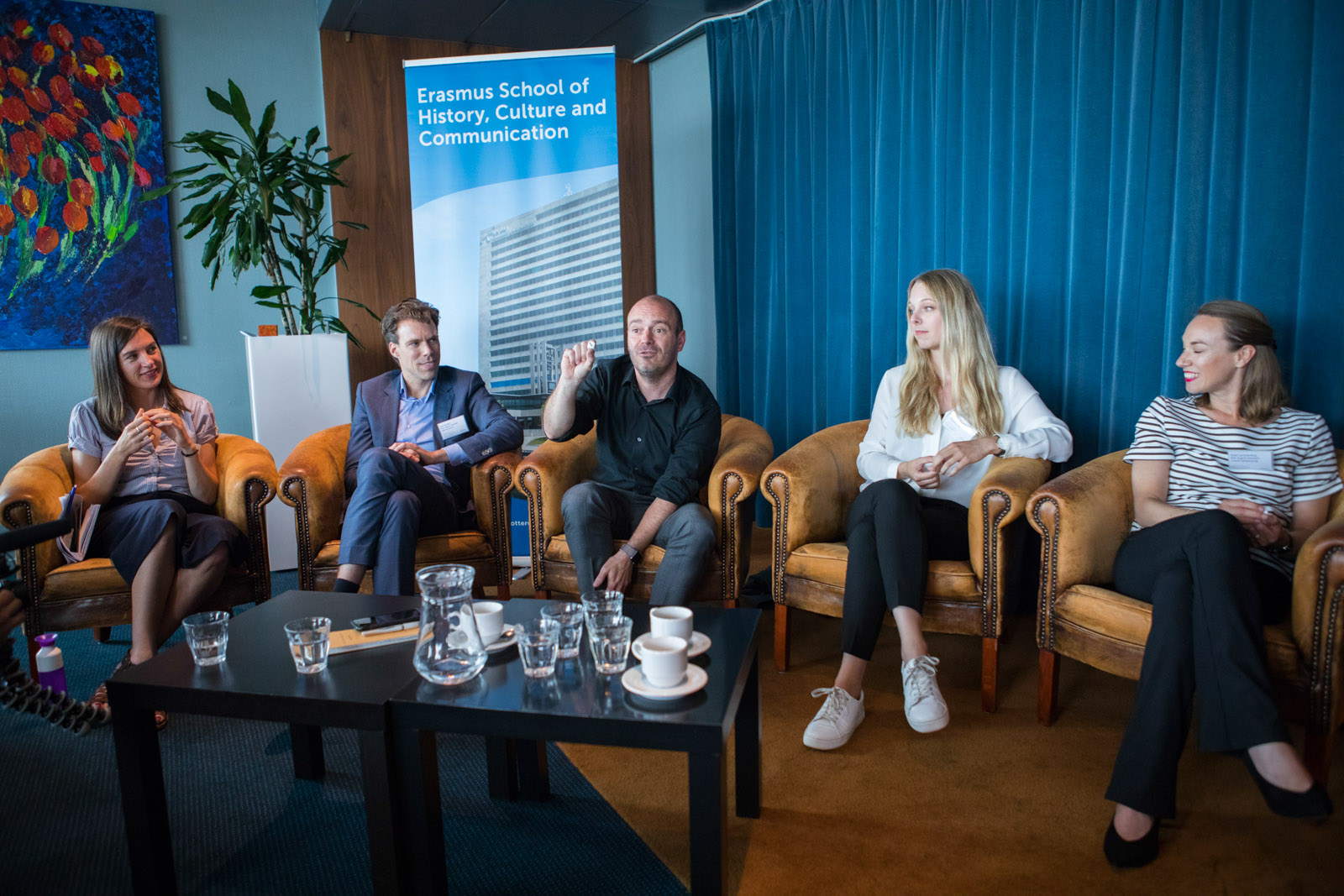PAC stands for the Professional Advisory Committee, a committee that “consults on ideas and visions that keep our degree programmes in tune with existing and emerging needs of the communication, culture and media sectors.” Last week, PAC had their first World Café on The Power of Storytelling, and IBCoMagazine was invited to join in on the debate. So here is my story about a discussion on storytelling… ironic, right?
The World Café was set up in two parts. The afternoon started with a panel discussion, moderated by our own Mijke Slot, who talked with five experts in the field of Communication and Media about what they think is important in telling a good story, and what their favorite story is. It was an interesting question, as it immediately showed the different types of people that were in the panel. Where one mentioned the storytelling of a particular brand or company, another pointed out a story about a Dutch farmer’s plights living in the USA at the time of recession, and again, another talked about the stories of migration. These were all types of storytelling, with similar yet unique characteristics.
The panel consisted of Dewi Lammerding, former digital transformation manager at Hearst Netherlands, Shelley Barendregt, who is a brand relations manager at FITGIRLCODE, Freek Staps, editor in chief at Dept, Rolf Harbers, senior consultant corporate communication & public affairs at Hill + Knowlton – which basically means: spin doctor – and Mia McKenzie, coordinator of integration/UN migration agency at IOM.nl.
As many times with job titles in our sector, this description doesn’t give me a clue as to what they do… except the editor in chief title. Fortunately, they provided us all with a folder where they had printed a more elaborative description of the professional careers of our experts for that afternoon. Descriptions that were so extensive, that I am not going to put them in here. Just google them 😉

And then the serious business began: the discussions. Three rounds of discussion where students had to sit at a different table every time and discuss the questions that were given to us. Every round, there was a new question. Two questions were set up by PAC, and a third question was one created by the expert at that table. We ended up discussing the characteristics of a good story, the skills of a good storyteller, the sharing of positive stories to counter negative ones in the case of migration, the possibility of overusing storytelling, a case study about the Loo Palace and more.
Although everybody started off a bit shy, unknowing what to do or say, the discussion started to have a more natural flow through time. Whenever there was a silence, either the moderator or expert would come up with follow up questions or thoughts that could restart conversation. But we as IBCoM students usually do not have a hard time talking, asking questions and displaying curiosity, and the experts happily answered all the questions we threw at them.

At the end of every discussion round (after twenty minutes), the moderators would sum up what the main conclusions where at their table. It was interesting to see both the similarities and differences every table had in their ideas. It displayed both the similarities and differences between, for example, journalism and advertising or public relations, and the way all disciplines make use of storytelling.

As Tessa Boon, one of the PAC staff members, said to me after the World Café: “It is interesting to see that in so many different disciplines, there are still a lot of similarities in the answers to the questions. It shows how many ways and directions you can take with a program as IBCoM.”
As I said, the third round was a discussion question provided by the experts themselves. I ended up at the table of Mia McKenzie with Amanda Alencar as PAC moderator. Although I am myself not an expert on the topic of migration and immigrants, I found the discussion incredibly interesting. How do we counter negative perceptions of migration by sharing positive stories? Is victimization a good or bad frame of perception? How do you keep shifting the narrative to constantly make it interesting and new for the media agenda, even though it is always about migration?
The World Café was about storytelling. But actually, it was about much more than that.
For those thinking this is just me being positive about the event, because the faculty told me to, should talk to all the other students that went to this event. Before, during and after I talked to several of our lovely IBCoM students and all were sincerely interested in the panel and discussion.
As a first-year IBCoM student, Wouter, told me: “It is fun that everybody is participating in the discussions and conversations. Everybody thinks about the topic and adds to the conversation. I would like to go to the next one in September as well, no matter the topic. Basically all the topics related to IBCoM could be interesting for such a panel. There is plenty to discuss.”
The afternoon was closed off by a fun group picture, thank-you gifts for the experts for joining us and a small lottery where three students received a box of delicious chocolates. Too bad I wasn’t one of them… Still, a little ‘shout-out’ to Yijing Wang, Amanda Paz Alencar, Mijke Slot, Joep Hofhuis and Renée Mast for organising this engaging event.
The PAC World Café will be held biannually, in the Fall and Spring. The next one is scheduled in September and will have the same concept, just a different topic and probably different experts.



